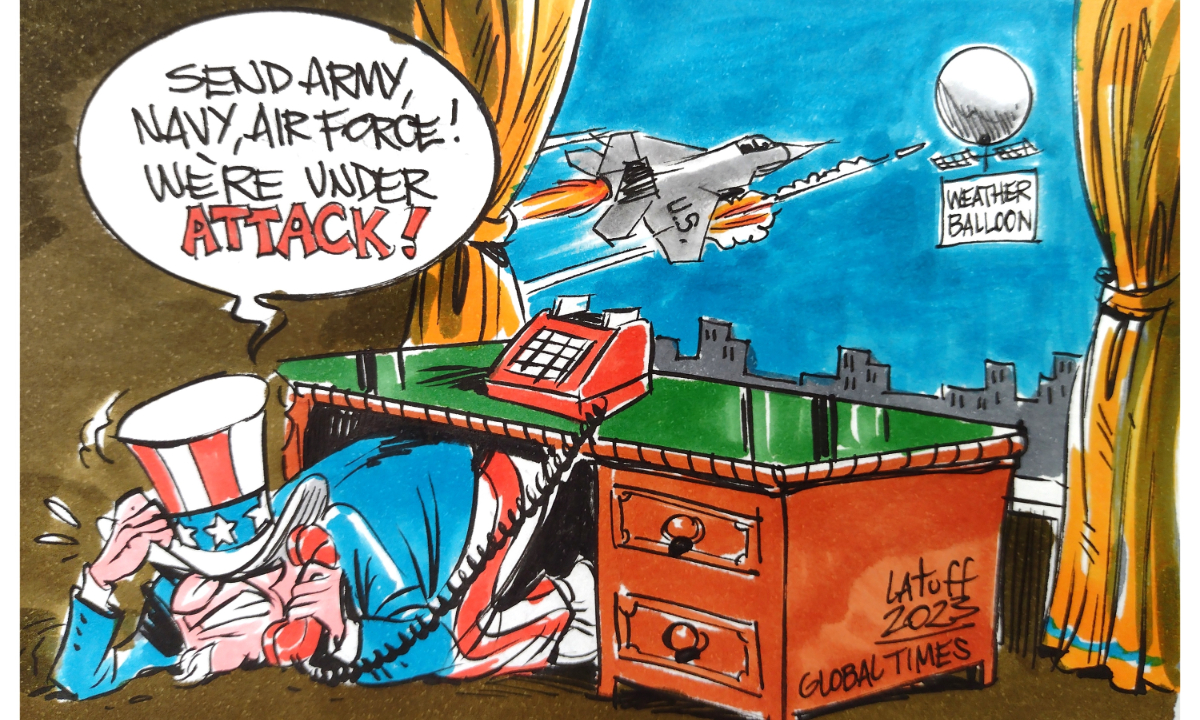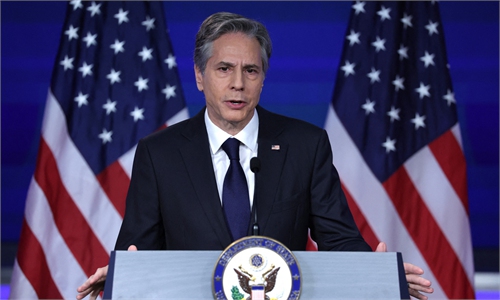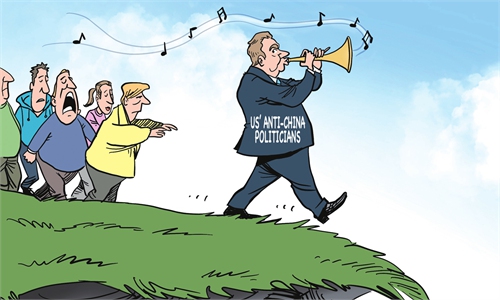CNN hyping the balloon incident as 'defining moment' in new Cold War illustrates how far US has gone in deteriorating its ties with China

US overreacts by shooting down Chinese weather balloon. Cartoon: Carlos Latuff
CNN on Monday published an analysis entitled "Why the Chinese balloon crisis could be a defining moment in the new Cold War," saying that "The Chinese balloon saga threatens to be a watershed moment in the world's dangerous new superpower rivalry: For the first time, Americans experienced a tangible symbol of the national security challenge from Beijing."
A civilian Chinese airship can be sensationalized as "a defining moment in the new Cold War," which illustrates how far Washington has gone in deteriorating its relations with China. This is not the first time in the world that balloons for scientific research went out of control. The US shooting down the airship dramatically aggravated this incident. The US' move seems to show the outside world its resolute manner of confrontation with China.
The rhetoric of this CNN piece displays that the main driving force of exacerbating China-US relations comes from a false "China threat" perception constructed by the US itself, which is essentially a product of American hegemony. Washington has set a standard of absolute national security, and then spread it among the American public for a long time via a set of media mechanisms, forming a false sense of security among them.
When there is any unexpected disturbance of external uncertainty, it will trigger a major setback. It is just like a jealous and arrogant one who thinks itself as powerful, but its heart is very fragile. It turns out the US is essentially a gigantic baby living in a false sense of security that it created.
The balloon posed no impact let alone a threat to US national security. Yet due to Washington's excessive hype, the so-called China threat theory has been promoted in a radical manner.
Another illustration is that republican congressman Michael Waltz on Sunday published an opinion on Fox News, describing the so-called Chinese spy balloon as "a Sputnik moment for America."
The balloon incident is a whole different story from the Sputnik satellite of the Soviet Union, and such hype and analogy are complete bollocks. The Sputnik moment referred to the Soviet Union's launch of the first artificial satellite Sputnik 1 in 1957, which shocked Washington as it hoped the US would accomplish this scientific advancement first. This triggered the US to considerably invest funds and sources to catch up. "Waltz's analogy between a Chinese civilian airship, which does not involve much technology, and Sputnik mirrors how ignorant, arrogant as well as vulnerable some US politicians are," Shen Yi, a professor at Fudan University, told the Global Times.
"If there is a Sputnik moment between Beijing and Washington, the Chinese tech giant Huawei's technological advancement in 5G is more like it. In response to the satellite Sputnik in 1957, Washington expanded its support for scientific research and education at an unprecedented rate, in a bid to boost US' capabilities to compete with the Soviet Union. But when dealing with Huawei, the US has adopted a series of means to suppress this tech company, instead of going all out to develop its own technology. It's also a sign of the US' decline," noted Shen.
As an "after-effect," Washington may push some more radical matters regarding China-US relations in the future, and may use the set of approaches against the Soviet Union to deal with China. The US' excessive exaggeration of the balloon incident is also an attempt to mobilize the US public to gain their understanding for the US government's use of national resources to compete with China without a bottom line. The question is, does the US today have the confidence and ability to cope with China in this way?
White House press secretary Karine Jean-Pierre said on Monday that "It's up to China to figure out what kind of relationship they want." Such a line is to pass the buck of deterioration of China-US relations to China. China has released a pile of goodwill to improve its ties with Washington, but if the US wants China to behave in a meek and subservient manner, it would be nothing more than a pipe dream.


